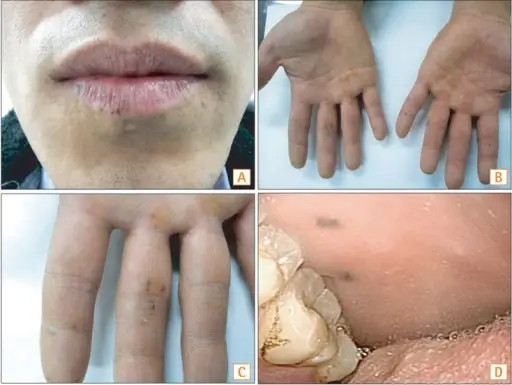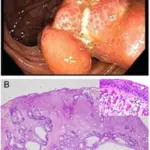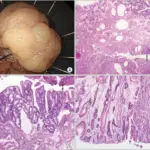Peutz-Jeghers syndrome is an inherited condition that puts people at an increased risk for developing hamartomatous polyps in the digestive tract, as well as cancers of the breast, colon, rectum, pancreas, stomach, testicles, ovaries, lung, and cervix.
What is the Pathology of Peutz-Jeghers Syndrome?
The pathology of Peutz-Jeghers syndrome is:
-Etiology: The cause of Peutz-Jeghers syndrome is a mutation in the STK11 gene, also known as the LKB1 gene.
-Genes involved: STK11.
-Pathogenesis: The sequence of events that lead to Peutz-Jeghers syndrome an autosomal dominant syndrome with incomplete and variable penetrance. About 50% of PJS patients have loss-of-function heterozygous mutations in a tumor suppressor gene STK11.
-Histology: The histology associated with Peutz-Jeghers syndrome shows a distinctive arborization of smooth muscle within the lamina propria.
How does Peutz-Jeghers Syndrome Present?
Patients with Peutz-Jeghers syndrome typically are all genders and symptoms appear at 10 years of age. The symptoms, features, and clinical findings associated with Peutz-Jeghers syndrome include: characteristic dark-colored spots, development of hamartomatous polyps non-cancerous overgrowths of tissue, small bowel obstruction, and gastrointestinal bleeding.
How is Peutz-Jeghers Syndrome Diagnosed?
Peutz-jeghers syndrome is diagnosed by gastroenterology GI endoscopy and a colonoscopy.
How is Peutz-Jeghers Syndrome Treated?
Peutz-Jeghers syndrome is treated by endoscopy and removal.
What is the Prognosis of Peutz-Jeghers Syndrome?
The prognosis of Peutz-Jeghers syndrome is fair. It is a life-long condition that can be passed on to children. People with PJS need to be checked frequently for developing polyps. Those polyps can develop into cancer or cause a blockage that could require surgery.



